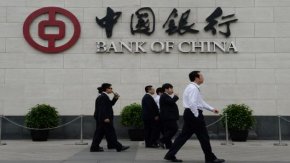
Blockchain Markets
 Mark Ralston | AFP | Getty Images
Mark Ralston | AFP | Getty Images
Chinese banks are hiring blockchain experts as the government pushes use of the technology behind bitcoin to increase transparency and combat fraud in its financial sector.
Lenders have struggled for years with outdated and disparate technology. While four Chinese banks rank among the world's five largest by capital, many still use paper, faxes and traditional chop stamps to verify documents.
Now, spurred by regulators, they are looking to use blockchain to leapfrog a generation of technology and clean up the system, bankers and blockchain experts say.
Demand from Chinese banks for experience in blockchain more than doubled last year and will grow further this year, headhunters and blockchain professionals say, as lenders scramble to catch up with Western counterparts that have already invested $1.5 billion in the technology.
"Demand is increasing rapidly and shows no sign of slowing. We expect similar levels of year-on-year growth in 2017, " said Simon Lance, managing director of executive search firm Hays in China, which is hiring for a number of Chinese banks.
Banks and headhunters are trawling Chinese universities for talent and luring tech start-up executives with 50 percent pay rises and salaries of up to 1.2 million yuan ($175, 000).
Blockchain is a ledger system that processes, stores and tracks digital information, from crypto-currencies to loan agreements. Because blockchain documents all changes and is hard to tamper with, financial firms and regulators see it as a potential way to make transactions more transparent, auditable and secure.
Beijing wants banks to adopt the technology to help combat chronic fraud such as fake trade finance deals.
Banks including Ping An Bank and Bank of China have unveiled blockchain investments and projects, and around ten banks are looking to hire some 30 blockchain professionals, said Steven Shen, a senior manager at executive search firm Robert Walters in Shanghai.
Six Chinese banks contacted by Reuters declined to comment.
Outmoded technology
Last year, multiple cases of fraud emerged in the archaic bills financing industry when it was found bills thought to have been kept in a safe were actually old newspapers, and the real documents had been used to raise margin financing.
According to business intelligence firm Kroll, 86 percent of companies surveyed in China reported fraud in 2016, four percentage points above the global average, and up 13 percent on 2015.
In October, the Ministry of Industry and Information Technology identified blockchain as a fraud-fighting tool, and called on "every level of government" to encourage large firms to invest more in the technology.
The People's Bank of China, the top financial regulator, has also signaled support for blockchain, with the central bank's chief Zhou Xiaochuan telling local media last year it had spent "significant resources" researching the technology.
"China is really interested in blockchain, " said Brian Behlendorf, executive director of the Hyperledger Project, one of the biggest global blockchain projects, and a former technology adviser to the White House. "They're looking at this as a leapfrog technology. Can you take a very backward, very paper based market, and reinvent that using blockchain?"
Banks are testing blockchain for know-your-client documentation, trade finance transactions, payments, and asset custody.
Over the past year, financial conglomerate Ping An has built a core blockchain team of around 35 people at group level to look at initiatives for asset registries, credit, payments and digital currencies, said Daniel Tu, group chief innovation officer at Ping An Insurance. If the projects are successful, Ping An subsidiaries will also assign full-time blockchain experts, he added.









